Sexually Transmitted Diseases (STDs) are extremely transmissible infections among people. These infections are passed from a person to a person who has sexual intercourse (vaginal, anal or oral sex). Several of these include Chlamydia, Genital Warts, Gonorrhea, Hepatitis B, Herpes, HIV and AIDS, HPV, Pubic Lice, Scabies, and Syphilis.
A lot of people infected by any sexually transmitted disease aren’t aware until they get tested, simply because many diseases don’t have the symptoms until very late in the process of their development when they get extremely dangerous.
Fortunately, nowadays it is very easy to get tested, and treating these infections is easy and painless. This guide has a well-researched material that includes in-depth material on what genital warts are, the main causes of the infection, and its symptoms and treatments (medical and at home treatments).
You will learn how to avoid getting infected but also how to recognize in case you have genital warts.
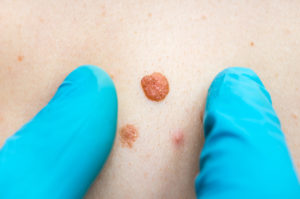 Out of the previously mentioned sexually transmitted diseases, according to medical practitioners, genital warts are the most common type of infection present in the general population. The largely targeted group of people are persons between 18 and 28 years of age.This malignancy occurs as a result of direct infection with the HPV-Human Papilloma Virus, high-risk types of HPV to be specific.
Out of the previously mentioned sexually transmitted diseases, according to medical practitioners, genital warts are the most common type of infection present in the general population. The largely targeted group of people are persons between 18 and 28 years of age.This malignancy occurs as a result of direct infection with the HPV-Human Papilloma Virus, high-risk types of HPV to be specific.
However, it has been found that not everyone who has this virus will develop genital warts for sure.This is because the body fights the infections on its own, and at times, and with a strong immune system, the body is able to clear the viruses out and get rid of any dangers on its own. The visible, external genital warts are shown to be the most dangerous form of warts, but the body is also able to get rid of this infection over time.
So due to this, it’s rare for the health to be affected in the long-term.
However, this doesn’t mean that you shouldn’t be concerned if you are infected. Treating warts or any STD on time is crucial for your well-being and optimal health.
The first step to getting the right treatment for genital warts is being diagnosed properly. You need to know how to recognize the symptoms of this infection and also what it looks like, so you address it in the right way.
Namely, genital warts look like bumps or blemishes and they can be skin-colored or white. You can have only one, or you might get numerous ones, big or small, that itch – but don’t hurt. These bumps will show in the area of the scrotum, anus, penis, vulva, cervix or vagina. This being said, you need to know that not all bumps down there are necessarily genital warts.
There are many other infections that manifest similarly, so if you believe you have genital warts or any other infection, as a matter of fact, you need to get checked by a medical person as soon as possible.
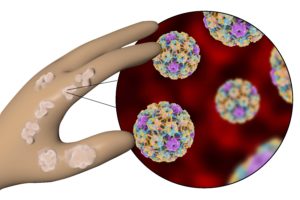
It is very hard to know when you have an HPV infection and how you got it – who passed it to you, because it can take weeks, months and at times even years after you have had the sexual contact
with someone who was a carrier of genital warts, for them to show up on you. It is possible for the virus to be present in your genital area but never develop warts so you might be infected at any time but not show any symptoms. Also in some people, warts appear only once, and then never again. And in certain cases, people develop recurring warts – they come and go more than once.
Besides the common genital places where genital warts appear, they can also spread in the throat or the mouth of the person who had oral sexual intercourse with the carrier of this infection.
Medical statistics show that a person can have the HPV type that causes warts, but he or she might never get the symptoms. They can only be carriers unknowingly, and transfer these warts to other people unintentionally. This is why there are many problems like a relationship or ever marriage problems with people over time because once they discover they have genital warts, they think their partner cheated on them and then passed the infection on them.
This is why openly talking to your partner/ husband and your doctor might help in discovering the time of the source of genital warts.
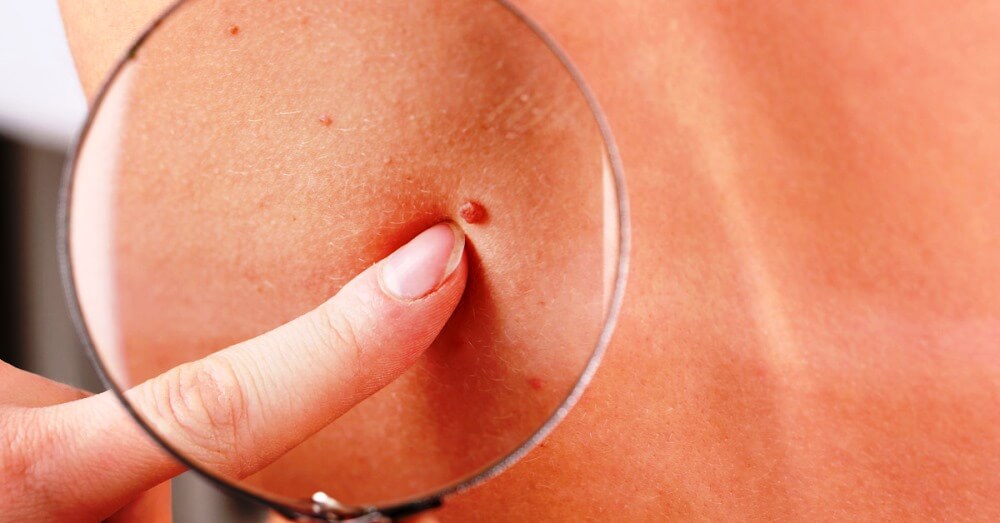
The Centers for Disease Control and Prevention lead an extensive research on sexually transmitted illnesses for many years now and according to their findings they claim that almost every person who is sexually active and who has had a sexual intercourse in their life, at one point will be infected with some kind of sexual infection whether they are careful or not.
It may sound scary but the risk factors are present and they are too many for people to successfully avoid. The medical association has presented that there are around 40 strains of the Human Papillomavirus that are specifically inclined towards attacking the genital area. They are all different among themselves, thus it’s hard to know which one is which at first sight.
The reason why it’s hard to know when you initially get infected is that the immune system kills the cells of the The Centers for Disease Control and Prevention lead an extensive research on sexually transmitted illnesses for many years now and according to their findings they claim that almost every person who is sexually active and who has had a sexual intercourse in their life, at one point will be infected with some kind of sexual infection whether they are careful or not. It may sound scary but the risk factors are present and they are too many for people to successfully avoid.
The medical association has presented that there are around 40 strains of the human papillomavirus that are specifically inclined towards attacking the genital area. They are all different among themselves, thus it’s hard to know which one is which at first sight. The reason why it’s hard to know when you initially get infected is that the immune system kills the cells of the genital HPV so it’s impossible for you to get signs or symptoms of the infection, in order to treat it on time. There are more than 40 different strains of HPV that specifically affect the genital area. Genital HPV is spread through sexual contact.
In general cases, the immune system kills the HPV and you never develop cancer or any sexually transmitted diseases.
Here are the possible situations in life that contribute to increasing the risk factors that bring sexually transmitted diseases with them:
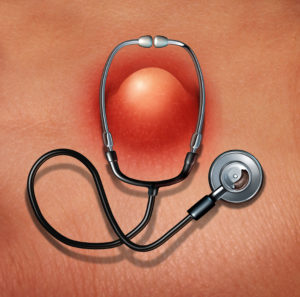
Depending on each person’s immune system, the symptoms can appear right away or lack their presence for weeks, months or even years at a time. This means that when you become sexually active, it’s extremely important to get regular doctor checkups – HPV checkups are done every 6 to 12 months depending on age in women – and track the changes you are feeling down in your genital area.
Besides the bumps appearing in the general area of the genitals, they can appear in other places too, and cause different problems.
For instance, the tube that is connected to the bladder in the lower stomach area is called urethra. Through it passes urine, and when warts have developed near, around or inside this tube, the normal, natural flow of urine is disrupted.
Men and women, although they get same warts, and the infection transmits the same way, the manifestation of it isn’t the same in both genders. Below are the main similarities and differences of genital warts in men and women.
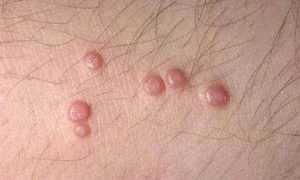
According to research done in medical records, it is now known that genital warts most likely appear on the walls of the vagina, the vulva or the external area between the genitals and anus. Women also reported genital warts in the anal canal and around the cervix.
The most common places for genital warts to develop in women are:
Men get the same symptoms of itching and bumps that are skin-colored or whitish in the area of the scrotum, the anus or they may occur on the tip or shaft of the penis.
The most common places for genital warts to develop in women are:
General Signs and Symptoms of The Genital Warts:
Although they experience them in different places of the genital area, genital warts in men and women do have many similarities when they appear in both genders.
For instance, they are small, bumps-like whitish, gray or flesh-colored swellings. Since each bump grows next to the other, when they form together they take on a cauliflower-like shape which causes an extreme discomfort, swelling and itching in the genital area and inner thighs.
When in more developed stages, these bumps can bleed during intercourse or just by wearing clothes or itching them.
There is a high possibility that if your partner has genital warts and you don’t, besides him or her testing for STD and getting treated, you should do it too. This is because genital warts take from 8 to 18 months after infection to become apparent and visible. So if one of you has them, the other should immediately go and get checked up. In the beginning, genital warts are very small and sometimes they stay that way during their
existence.
This makes them impossible to detect and you oftentimes might get the itch and discomfort, but don’t know where they come from or why as a matter of fact. This is when you should seek medical examination and tests.
However, as time passes, in many people they tend to grow larger, multiplying and forming groups of bumps, turning into big clusters. These are easily eye-visible and should be treated immediately.
Now that you know how to detect

them, and what the symptoms are in their existence, it is as important to know how to seek medical help and how to diagnose them properly.
As we said before, genital warts are very small at times and basically undetectable with the naked eye. This is why when you go to the doctor’s office with the symptoms of genital warts, he or she might apply a mild acetic solution that is also acidic to the areas where you feel the itching and discomfort the most.
The acidic solution will whiten these problematic bumps (if they aren’t white already) and will make them easily detectable with a colposcopy – a special magnifying instrument.
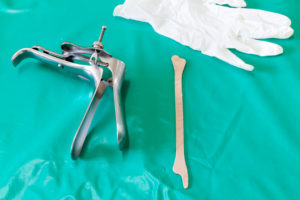
In order to treat genital warts and other STDs, you need to make certain tests regularly. The Pap Test is one of them. This test will detect any cervical or vaginal changes that normally occur because of genital warts or early signs of cervical cancer which is a possible side-effect caused by a genital HPV infection.
The Pap Test isn’t something to be afraid of, and you shouldn’t fear to do it regularly. Older women past 35 years of age should do Pap tests every 6 months, and women below that once a year. It is done very painlessly and quickly in your gynecologist’s office.
Namely, once you schedule a Pap test, the doctor will use a tool that is used to open your vagina and hold it that way. This tool is called a speculum and except the coldness of it, it doesn’t hurt at all.
Afterwards, the doctor will collect a sample of vaginal cells using a long-handled tool from the cervix which is the passage of the canal that connects your vagina with your uterus.
These vaginal cells are examined under a microscope for abnormalities and the results are obtained after few days or weeks depending on the doctor’s laboratory.
Also, these cervical cells during a Pap test are being examined for the cancer-causing HPV strains
since few types of genital HPV have been linked to cervical cancer as well.
The second test that men and women should consider both in discovering genital warts or any type of sexually transmitted disease is the HPV test. This is recommended for people of 30 years of age or above because prior to that the test isn’t very useful since the immune system kills any cancer-causing cells and varieties of genital infections of HPV without treatment.
Genital warts, in general, don’t cause major health problems and complications, however, if left untreated their complications will include:
 Cancer
CancerCervical cancers are linked to HPV infections in the vulva, anus, cancer of the mouth and throat or in the penis.
The Human papillomavirus infection doesn’t necessarily lead to cancer.
But it’s very important for women to get regular checkups like Pap tests.
 Problems during pregnancy
Problems during pregnancyYour genital warts may cause problems during the delivery of the baby if they are in your vaginal tissues and limit their stretching ability.
Many women who are pregnant fear of causing harm to their baby by treating their genital warts.
However this should not scare you too much, but you need to let your doctor know because the changes in your hormones during pregnancy might cause warts to get larger and bleed. Good news is that there has been no link between any type of HPV and miscarriage, premature delivery, or other pregnancy complications.
In addition, the risk of transferring the infection onto your baby is very low to non-existent, as their immune system will fight off the disease successfully on its own.
However if genital get too big and obstruct the normal baby delivery, then the doctor will need to remove them before you have your baby.
 Baby problems
Baby problemsRarely, but still possible is for the baby to catch genital warts in his or her throat if the mother has had them during her pregnancy.
In this case, surgery is required in order to make sure that the airways of the baby aren’t blocked and it can function properly.

When you first notice any unusual changes in your genital area, you should consider visiting your family doctor immediately. Women should contact their gynecologist right away and schedule an appointment. Once there, it is of utmost importance to bring up every change that has happened to you and each symptom you might be experiencing.
To make sure you don’t miss out anything important that might give your doctor a clear picture of your state is to make a list of everything that you are experiencing.
Be sure to include whether your sexual partner has ever felt the same or similar symptoms as you. Another important thing to take notice of is your sexual history. You should list all recent sexual intercourses that might provoke or cause genital warts. These can be anything from unprotected sex to having sex with a new partner.
Stating all your recent possible sources of infection is the key to diagnosing the infection with high accuracy.
 When you first notice any unusual changes in your genital area, you should consider visiting your family doctor immediately. Women should contact their Gynecologist right away and schedule an appointment.
When you first notice any unusual changes in your genital area, you should consider visiting your family doctor immediately. Women should contact their Gynecologist right away and schedule an appointment.
Once there, it is of utmost importance to bring up every change that has happened to you and each symptom you might be experiencing.
To make sure you don’t miss out anything important that might give your doctor a clear picture of your state is to make a list of everything that you are experiencing.
Be sure to include whether your sexual partner has ever felt the same or similar symptoms as you. Another important thing to take notice of is your sexual history. You should list all recent sexual intercourses that might provoke or cause genital warts. These can be anything from unprotected sex to having sex with a new partner.
Stating all your recent possible sources of infection is the key to diagnosing the infection with high accuracy.
People often leave out crucial medical information that may be vital in treating genital warts. Naming all conditions you are being currently treated for is very important to get the whole picture of your health. Here, you should name all the medications, supplements and vitamins you are using.
Note that at any time of your appointment, while you are talking with your doctor, you need to and should ask questions if there are things that are unclear to you. If you understand your condition well, you can treat it well and get better soon, if not, you might only cause further complications. This being said, you might want to write down all the questions you have in your head about genital warts.
Make most of your time with the doctor and be sure to ask these basic questions, but also feel free to include some other more personal ones to address the infection more closely:

Now that you know what you should ask your doctor, you need to also know what to expect from him other,
what questions they might ask you, in order to be fully prepared for this appointment.
The questions will be numerous in order for him or her to understand your situation better and examine you in-depth.

While these are the most common questions to be asked by your doctor, be prepared to hear more that go deep into your intimate life,
but nevertheless, you should always answer honestly, as it is because honest answers are crucial to discovering the roots of your problem and how to treat the infection.
 How to talk to your partner about warts?
How to talk to your partner about warts?We understand it can be hard to talk about this, and you may feel embarrassed, but this is something common as you can read in the statistics that we mentioned earlier, so try to stay calm about it and not stress out too much.
We understand that talking to your partner and letting her or him know that you have some form of STD is stressful and you don’t know what to expect, but there are many ways how to do it and below we will mention several of those proven to be the most effective in these kinds of situations.
Having a calm, positive attitude towards this situation of having genital warts will help you and your partner understand the situation better. Most couples don’t have a problem with this and they understand that it’s just a minor health issue that anyone could have gotten it,
So it doesn’t mean anything (bad) for you as a person.
An STD like genital warts is extremely common and easy to catch, so who knows? Maybe your partner has them too, so talking about it is extremely important for their health as well. Ask him or her if they ever got tested, if they’ve been vaccinated or if they have had an STD before.
Knowing all the fact about genital warts and all the other sexually transmitted diseases will not only help you treat it well, but it will also make things easier when it comes to talking about it. There is a plethora of misinformation about STIs everywhere, so talking to doctors and reading books are your best choices in setting the records straight.
Talk to your partner openly and let them know that there’s a possibility to get genital warts from other sources, not only by having sex, thus you haven’t cheated on them.
Also, remind him or her that there are ways to protect against passing this infection during sex and in worst cases that it isn’t dangerous and it won’t cause any serious health issues like cancer.
Prepare for the talk and pick a time and place that will make you both relaxed and not get distracted by anyone or anything. Seek advice from friends or family first, if you are afraid of the talk with your partner. Talking to them or practicing with yourself first will make you feel better about the whole situation and you will be more confident when you tell your partner.
Even though it can totally be out of your control, and getting the genital warts isn’t your fault in the first place, some partners might react badly. This is when you need to take safety measures and find a way of telling him or her without the possibility of them hurting you. Maybe email them or text, or phone call, or in worst case scenarios, don’t tell them at all.
It’s extremely important for your partner to know about your situation with genital warts, but you should tell them when you feel ready – and certainly before having sex. It might not be wise to tell them on your first date, but they have the right to know, and it’s only fair to let him or her know before you two have sexual intercourse.
So, when your relationship progresses and you feel like you have trust in the person, that’s when it’s a good time to talk openly about genital warts.
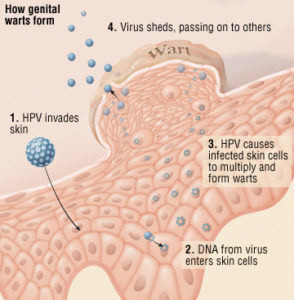
Although sexually transmitted illnesses aren’t a new thing and they are quite common,
the medical centers are doing everything they can to raise the awareness of people about these infections and make them more aware of their causes and how to prevent them from happening.
It’s true, now in these days the technology is advanced and we have a cure for almost anything, but you will agree when we say that prevention is better than treatment.
So, before going into the treatments, medical and homemade – for genital warts and HPV in general, you need to know how to protect yourself from these harmful infections in the first place.
The prevention of this sexually transmitted illness will make your life easier and save you from the troubles that STDs might cause you further on.
The most painless and inexpensive form of prevention of genital warts and any type of sexually transmitted illnesses is the use of condoms. The use of condoms each time you have a sexual intercourse will significantly reduce the risks of getting genital warts.
However, you need to be aware that condoms might be a better protection of other sexual diseases rather than for genital warts because certain areas of your genitals might still touch skin – to – skin with the infected person. This makes condoms less than 100% effective when it comes to genital warts.
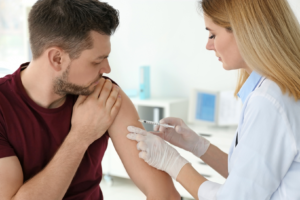
Invented to prevent numerous infections, diseases, and illnesses, vaccines have been around for decades now. As there are vaccines for almost anything, there are also for strains of HPV that cause cancer, 4 strains to be precise, and are also used for the prevention of genital warts. One of these vaccines is called Gardasil.
However, as a more protective vaccine against cancerous strains of HPV, in 2014 Gardasil 9 was invented by the U.S. Food and Drug Administration to protect against 9 strains of HPV that cause cancer.
A third vaccine that has been produced at the same time as the previous one is called Cervarix. This vaccine, however, doesn’t protect against genital warts but does protect you from cervical cancer.
In addition to these vaccines that are taken voluntarily after you become sexually active and you want to protect yourself from STDs, the National Advisory Committee on Immunization Practices advises parents to vaccinate their children, both boys at 12 and girls at 11 years of age. Vaccinating children before they turn into sexually active adults make these preventing vaccines the most effective. It is stated that genital warts infections might be reduced by as much as 50% in a person who received the vaccine under the age of 21 or the age between 21 and 30.
In case you haven’t had the vaccination sooner, it’s recommended you get one through the
age of 26 in girls, and through the age of 21 to 26 in boys, if desired.
When injected with the virus from these infections it is normal to experience certain side effects. You should know that this is totally normal and you shouldn’t panic.
Vaccine side-effects will include:

 There are few other ways to protect yourself from getting genital warts, although nothing is as effective as not having a sexual contact at all.
There are few other ways to protect yourself from getting genital warts, although nothing is as effective as not having a sexual contact at all.
The first thing you can do is use a dental dam. It is a plastic square made out of latex or polyurethane. It can be used to cover the genital area and organs of the female during sexual intercourse to avoid skin – to – skin contact. Dental dams also provide protection against oral sex.
They practically look like a flattened condom – a thin piece of a sheet made of latex originally used in dental work, however, they have been found useful as a barrier for the protection of sexually transmitted diseases.
Dental dams aren’t so available in general stores and pharmacies. If you live in the US and you have Planned Parenthood locations near you, then you should look there.
Also, it is sometimes possible to find them at specialty sex stores or order online. They are also available at sexual health and genitourinary medicine (GUM) clinics, and it is possible that your pharmacist is able to order dental dams for you.
Another thing to stop doing in order to prevent getting infected with genital warts is to avoid sharing sex toys, or if you do it, then wash them thoroughly after someone has given them back to you and cover it with a condom before someone else uses it.
Thirdly, you should stop using shared toiletry things like towels. Many people infected with genital warts claimed that they didn’t have any sexual relationships in the recent history, however, they did recall using shared personal items like towels. So when you travel, it’s in your best interest if you bring your own towels with you rather than using some that you aren’t sure of their previous users of if they have been washed properly.
Last but not least, in order to avoid getting infected with genital warts or any kind of sexually transmitted disease you need to maintain high standards of personal hygiene.
Although getting genital warts doesn’t mean that you haven’t had a good level of hygiene. It is just that keeping it on a high level will help you control all infectious diseases strictly.
So by being cautious of all the things around you, you will be safe from becoming a host of other infections.
Following these 4 steps will help you free yourself and protect those around you from receiving numerous STDs like gonorrhea, Chlamydia, and HIV.

Genital warts are extremely common among people today, and statistics worldwide show that annually the number of infected people who seek help and treatment from their doctors is above 350,000 each year.They predict that this number will go up in the future years, only because this sexually transmitted disease is very easy to catch.
However, contrary to this popular belief, people are having their awareness raised and are getting smarter about using contraceptives in order to protect themselves as much as possible.
The human papillomavirus (HPV) is sometimes tricky to fully understand and recognize even by doctors. It is the most common type of all the sexually transferred diseases and most of the time in more than half of the patients infected, it goes away on its own.
However, this doesn’t mean that it shouldn’t be taken seriously because there are certain types of “High-Risk” human papillomavirus that turn into cancer if left untreated.
Luckily, the type of human papillomavirus that causes warts isn’t the same one that causes cancer. This “Low-risk” type of human papillomavirus only gives you genital warts around the genital area and anus.
So, if you notice these bumps around your cervix, rectum, vagina, vulva, penis, anus or scrotum, there is no need to panic or think you’ve got cancer. It is only the low-risk HPV that can be easily tested and safely treated by medical people.
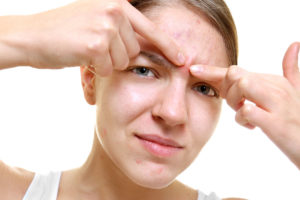 The way of getting genital warts is known – by skin – to – skin contact with a person who has them and who are already infected. However what isn’t so easily known is when you got them because as we said before, you can have them without knowing, and you only find out when they start spreading and developing in your genital area.
The way of getting genital warts is known – by skin – to – skin contact with a person who has them and who are already infected. However what isn’t so easily known is when you got them because as we said before, you can have them without knowing, and you only find out when they start spreading and developing in your genital area.
They are most easily transferred during oral, vaginal and anal sex. This being said, you should know that genital warts can be transferred even if during the sexual intercourse no one cums. The penis doesn’t even have to enter inside the vagina or anus for the person to get infected.
It is only needed for the people to touch skin – to – skin. Some less possible cases (although have happened before) are the transfer of genital warts from one person to the other, even if the carrier hasn’t had any warts visibly developed onto their genital area skin. The second case is that the mother can pass genital warts onto her baby during childbirth, while she delivers it, however that is pretty rare.
You cannot get genital warts by touching yourself or your partner with warts on your hands or feet. They aren’t the same kind, and they cannot be transferred to different areas of the body. When you notice a wart on your genitals you need to immediately seek help, and also the people around you because once you feel the symptoms, it is very easy to get them transferred to other people.
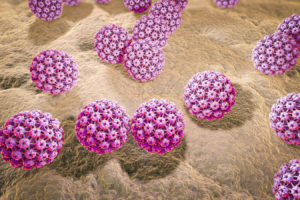 If you take this infection and the condition you are in serious, you will be able to treat it properly and not let it progress and cause any major issues. The fact of the matter is that genital warts and many other STDs with them have existed before conventional medicine progressed and got advanced to this degree, so it’s only logical that there are homemade, homeopathic treatments and new-age treatments that exist nowadays.
If you take this infection and the condition you are in serious, you will be able to treat it properly and not let it progress and cause any major issues. The fact of the matter is that genital warts and many other STDs with them have existed before conventional medicine progressed and got advanced to this degree, so it’s only logical that there are homemade, homeopathic treatments and new-age treatments that exist nowadays.
Normally, which one you use it up to you, but you should also take the condition and progression of your disease into account when deciding which treatment you go with.
The virus of genital warts also called venereal warts or condyloma is completely curable and doesn’t impose a major health concern.
However, once condyloma gets into contact with your skin, doctors say that it constantly stays there. So even after the genital warts are treated and removed by your doctor, and your skin has healed, the virus thrives beneath the surface of your skin among its first layers and it ready to reemerge at any time.
However, this doesn’t have to stress you out or come as a surprise, because if you follow the general instructions for staying safe and preventing the spreading of this venereal disease, you and the people around you will be safe.
 An array of therapies and treatments has been presented so far. These genital warts treatments target the infection in multiple ways through different techniques, whether surgically, topically or via immune modulation. These therapies differ when it comes to price, side effects, dosing, schedules, duration of treatment and the overall effectiveness.
An array of therapies and treatments has been presented so far. These genital warts treatments target the infection in multiple ways through different techniques, whether surgically, topically or via immune modulation. These therapies differ when it comes to price, side effects, dosing, schedules, duration of treatment and the overall effectiveness.
We already spoke about the routine HPV vaccination and its powerful role in reducing the risk of infections and their transmission.
Vaccines limit the burden of the disease by preventing it from going viral, and they gained valuable widespread approval as an instrument for decreasing the HPV infections and eradicating genital warts.
However they present only the prevention of this STD, not a treatment because once you get infected with genital warts, vaccines won’t do you any good at that point – you only need an applicable and appropriate therapy.
 Your doctor or the healthcare worker, after examining your situation, will prescribe for you a cream to use at home if genital warts haven’t progressed as much and you notice them in the beginning.
Your doctor or the healthcare worker, after examining your situation, will prescribe for you a cream to use at home if genital warts haven’t progressed as much and you notice them in the beginning.
These treatments are usually expensive so be sure to follow your doctor’s instructions for using them, and also make sure to finish all medication, because if you stop in the middle you might risk becoming re-infected if you stay half-treated like that. Ask all the questions you are concerned with and know exactly when and how often you should apply the cream.
Another solution for genital warts is burning them off in your doctor’s office. This is a less expensive method of treating this infection. If your warts are smaller and combined close together, then Podophyllotoxin will be the treatment for burning them off on you. Podophyllotoxin’s liquid is directly dropped on your warts with a stick, but there is also a cream to apply to them with Podophyllotoxin as the main ingredient.
However, it is said that the liquid form of Podophyllotoxin is more effective than the cream. You should use it for 2 to 3 days straight, and then take 4 to 5 days break off of it because it’s very strong and is burning the skin heavily.
When it comes to bigger genital warts, spread all over your genital area you will be most likely prescribed with Aldara or Imiquimod as a treatment by your doctor. This medicine should be only used for 3 days a week, for a month. You use it by applying it and then rinsing the skin area 8 hours later.
 When it comes to choosing your own medicine and treating genital warts at home, it is recommended that you should stay away from over-the-counter wart removal products. You need to resist the urge to use any of these because they are formulated strictly for non-genital warts. The side effects of using these non-genital warts creams might be worse than you would expect with no results whatsoever.
When it comes to choosing your own medicine and treating genital warts at home, it is recommended that you should stay away from over-the-counter wart removal products. You need to resist the urge to use any of these because they are formulated strictly for non-genital warts. The side effects of using these non-genital warts creams might be worse than you would expect with no results whatsoever.
Namely, they might burn your skin badly, but not treat the warts at all. This is because your skin is already heavily burned and overly sensitive by the warts, so using appropriate med will only do you worse.
Instead, consult with your doctor. He or she will prescribe the right topical treatment, or freeze them with liquid nitrogen, or remove them surgically, or by using a laser treatment.
V isit your gynecologist and ask him or her about all the possible skin treatments. It is highly likely that your gynecologist has in-office skin treating tools and devices to remove major outbreaks. Besides using liquid nitrogen to freeze off the genital warts, they might burn them off by applying Trichloroacetic Acid (TCA). This acid is used for very hard, small warts grown together.
isit your gynecologist and ask him or her about all the possible skin treatments. It is highly likely that your gynecologist has in-office skin treating tools and devices to remove major outbreaks. Besides using liquid nitrogen to freeze off the genital warts, they might burn them off by applying Trichloroacetic Acid (TCA). This acid is used for very hard, small warts grown together.
Because of the harsh nature of this acid, and the possibility for it to burn your neighboring skin badly, the doctor himself will apply it to you. You will feel the burn but it’s usually done once or twice so it is bearable.
The laser therapy or surgery will be recommended in case you didn’t treat your genital warts on time or for some reason the rest of the treatments didn’t work and your genital warts have turned into a major outbreak.
After the diagnosis of genital warts, there are things you can do to relieve the pain and enhance the effects of the medications.
The meds you have been prescribed with like creams and acids contain pretty damaging chemicals in them that burn off warts. Substances like podofilox and podophyllin need to be applied by your doctor or by yourself under your doctor’s supervision because they are very strong and harmful for the uninfected cells of the skin.
This treatment can take up to 4 works until your genital warts have completely shriveled up and fell off. This is why after applying of these medications, you need to wash them off every 3 to 5 hours after each application. Pat the area with a warm, lukewarm washcloth after taking a warm bath.
If your genital warts require liquid nitrogen or laser surgery, you need to prepare for what’s coming.
Namely, there will be skin or membrane irritations causing discomfort, and this is why you need to keep the area clean and dry so the skin heals faster and the whole thing goes away painlessly. You need to take baths or showers daily and wash the area with a mild PH neutral soap.
Pat dry the area and make sure it’s dry at all times.
 When it comes to soothing the itchiness that comes from the genital warts or the procedure that has been done to you to remove them, you should take special bath treatments like the Aveeno bath treatment available at any well-supplied drugstore. The powdered oatmeal is called colloidal oatmeal and presents an excellent antidote to itching that won’t clog the drain of your bathtub.
When it comes to soothing the itchiness that comes from the genital warts or the procedure that has been done to you to remove them, you should take special bath treatments like the Aveeno bath treatment available at any well-supplied drugstore. The powdered oatmeal is called colloidal oatmeal and presents an excellent antidote to itching that won’t clog the drain of your bathtub.
How effective the treatment is, depends on what was used to treat your genital warts. Creams are a more mild form and lasers and acids are the stronger therapies which will definitely work in case of major outbreaks. It also depends on your immune system, and how it will fight off the virus.
But rest assured that the doctor will estimate what will suit you best in order to get rid of the infection in the most optimal, painless way.
What you need at this point are patience and persistence. It takes even up to several months for some people to completely remove their genital warts. You will want to avoid all the creams, soaps and body lotions which you normally use, during the burning of the warts because they can irritate your skin further.
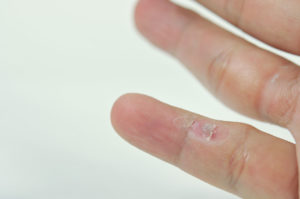
If you choose to treat them at home be sure to get some products that contain salicylic acid, as it is the safest way of treating genital warts. It will take months to destroy them but it has proven effective. Soak your affected area in water first, and then apply the product with salicylic acid.
The method of using ACV as a genital warts treatment is rather painful but effective since people report changes in 2 to 3 weeks time. Apply ACV with a cotton and leave it overnight.
First and foremost, you need to note that even after treating the genital warts with the treatment your doctor prescribed it’s highly possible that you still have the infection.
This is because you maystill have traces of Human Papillomavirus beneath your skin in the skin cells.
So this being the case, it is recommended that you use a condom during sex in the 2 to 3 following months after the genital warts have cleared up.